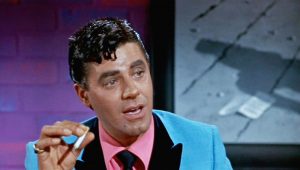The Nutty Professor (1963) starring Jerry Lewis, Stella Stevens

Whereas Kelp is barely tolerated … Love alternately bullies and sweet-talks his way into favor. The scene with him buttering up the college president, played by Del Moore, is wonderful. Until the end of the picture, when the formula wears off at the wrong time. The ‘Hyde’ Buddy Love slowly turns back into ‘Dr. Jekyll’ Julius Kelp. In front of the world, all while giving a wonderful speech that everyone should hear.
The DVD has the ordinary extras (trailers, outtakes) as well as a very nice documentary on The Nutty Professor, both the making of it and afterward.
Editorial Review of The Nutty Professor starring Jerry Lewis, Stella Stevens – courtesy of Amazon.com essential video
Jerry Lewis‘ 1963 Jekyll and Hyde variation has always been tagged by two popular assumptions: one is that it is his best work as a comic filmmaker, and the other is that Lewis’s Mr. Hyde equivalent — the slick, ultra-arrogant, good-looking womanizer Buddy Love — actually lampoons the director’s former partner, Dean Martin. Well, The Nutty Professor certainly is Lewis’s best film. But all one has to do is watch it to realize the motivation behind Buddy Love is more confessional: he’s really much more like Lewis’s darker, narcissistic side, while the shlubby scientist (also played by Lewis) from whom Love springs is closer to the star’s screen image.
You can watch all this psychodrama yourself and have a lot of good laughs at the same time with this unusual film, which still surpasses Eddie Murphy’s recent remake — though not necessarily by a wide gap. — Tom Keogh
Trivia for The Nutty Professor (1963) starring Jerry Lewis
- According to one of the trailers for this film, “We don’t care if you blab about the beginning of this picture; nor do we care if you give away the ending; but we do care if you reveal the middle. In fact, Jerry Lewis urges you to see this picture from the beginning, on penalty of losing your popcorn privileges.” This spoofs Alfred Hitchcock’s dictum that Psycho (1960) had to be seen from the beginning and his insistence that no latecomers be seated (“not even the [theatre] manager’s brother”).